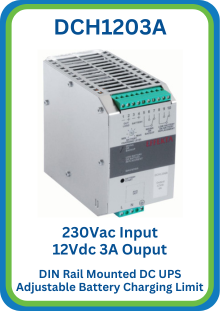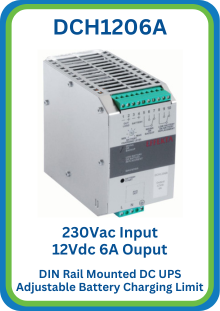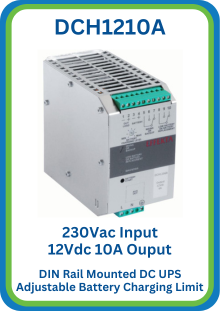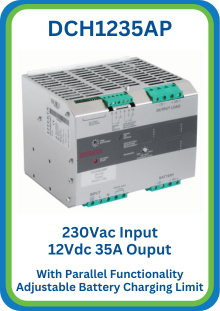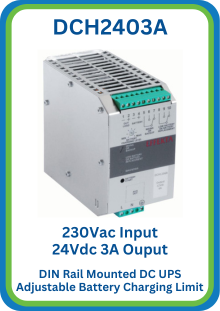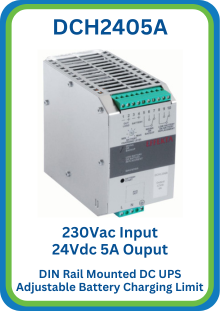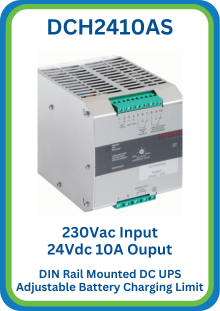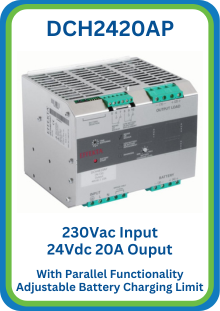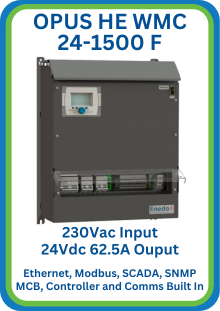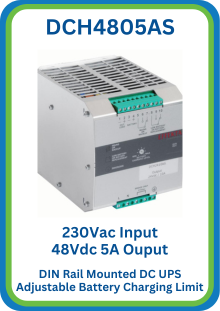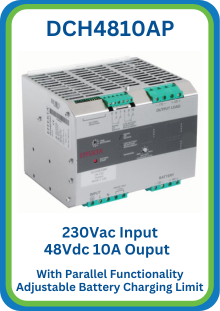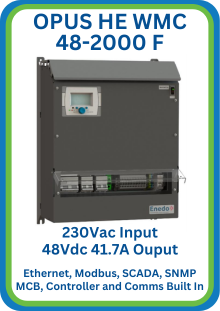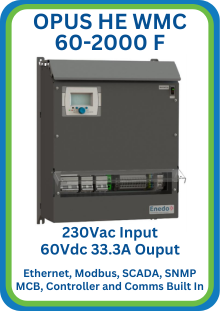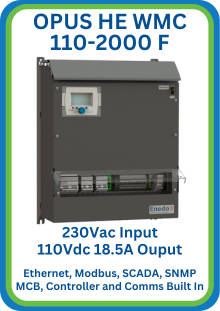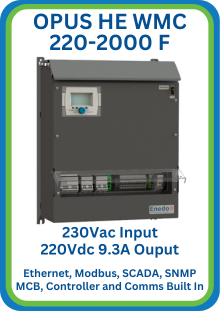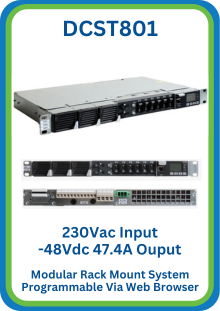.png)
DC UPS - An Explanation
DC UPS products are usually requested by customers that may not initially know what a DC UPS is, or does. However, they typically know what they require, battery backup.So, what is a DC UPS? Put simply, a DC UPS is a DC output power supply that will provide autonomy (backup) to a load in the event of a mains failure. There are several ways this can be achieved so for an example we will use the DCH range, an all-in-one solution. The DCH can take an AC input and provide a DC output to your load, just as a standard DC power supply would. However, it also has terminals on the output to wire to external batteries which it will charge with any spare capacity not used by the load.
So now you have a unit, that is both powering your load and charging your batteries, in a single unit with 1 AC input. When this mains fails, the DCH will switch to the batteries to power your load. It will continue to power the load using the batteries until either the mains returns or if the battery voltage drops too low. To avoid damaging the batteries the DCH will low voltage disconnect, avoiding deep discharge of the batteries.
Unlike AC UPS units, DC UPS typically use external batteries which should give you more flexibility on the autonomy options available. If you are using the DCH series, we can advise on battery sizes and options for your application so contact us with your required voltage, power and autonomy and we can send some suggestions.
All-In-One DC UPS
An All-In-One DC UPS is a 230Vac input to DC output unit, that provides an output to the load and an output to the batteries. This will also have standard features such as a switch over for when power fails, as well as deep discharge protection for protecting batteries. Due to the nature of these units, they are available for smaller outputs on the DCH series mounted on DIN Rail, up to high voltages on the MT and OPUS series.
As DC UPS requirements vary due to the voltage, output power and autonomy, it may be difficult to find what you are looking for. Please see some of our range as below, but if you have any questions on the ranges or aren't sure what you would require, please contact us so we can help you further.
12Vdc Output
24Vdc Output
48Vdc Output
Further Voltage Options
DC Redundancy Modules
Alongside the all-in one ranges, we can offer redundancy modules. These work by taking a DC input and adds the functionality required to use the system as a DC UPS. This includes deep discharge protection, as well as changeover during mains failute. These units are particularly useful for applications where a power supply system is already in place and redundancy is needed in one part of the system. Or, wherein a specific power supply has to be used, these can be used to fit within customer specifications whilst being easy to retrofit.
High Voltage and Bespoke DC UPS
Looking for higher voltages or need larger power outputs. Please visit our solutions pages below for more information, or contact us for more details.
Frequently Asked Questions
How does a DC UPS work?
A DC UPS takes an input, typically AC, and rectifies this to DC. This DC power is then used to charge the batteries, and power the load. In the event of a mains failure, the DC UPS provides output power to the load from the batteries. Finally, the DC UPS will disconnect the batteries from the load once it's Low Voltage Disconnect (LVD) voltage is reached. This is to protect the batteries from deep discharging.
What is the difference between DC UPS and AC UPS?
An AC UPS is designed to output an AC voltage, typically 230Vac or 110Vac depending on location, and a DC UPS is designed to output a set DC voltage. There are some design differences between the two types of UPS, such as:
- An AC UPS almost always has the same input voltage as it's output voltage. A DC UPS will usually have a mains AC voltage, but some have a DC input instead.
- An AC UPS typically has internal batteries, or batteries within a seperate cabinet. DC UPS usually require external batteries.
What is the difference between a UPS and DC chargers?
A UPS (either DC or AC output) is designed to take an input, and provide a battery backed up output. A DC Battery Charger is designed to output a DC voltage to charge a battery. Whilst a DC UPS or a DC battery charger will charge a battery, only the DC UPS will switch to battery backup in a mains fail and protect the battery from deep discharging.Do DC UPS have Internal Batteries?
Unlike AC UPS units, DC UPS typically use external batteries which should give you more flexibility on the autonomy options available.
Do DC UPS have an AC Input?
What is the output voltage on a DC UPS?
The output voltage is the same on both the battery output and load output. So as an example on a 24Vdc DC UPS system, during normal operation your battery and load will receive ~27.3Vdc output. In a mains failure system, your load will see the battery voltage until the low voltage disconnect is reached, as an example 21.5Vdc.
If your load voltage is sensitive, you can use a DC/DC converter on the output to stabilise this voltage. You can find more information on DC/DC converters in our FAQs, or feel free to contact us for advice on your DC UPS requirement.
Why Choose Us?
With 25 years of experience in DC power, we are here to balance the need of industry with the complexities of supply. As engineers first and foremost, our aim is to fix and find a solution above anything else. We aren’t just box shifters, we’re here to guide and advise so if you do have an enquiry please do let us know as we are always interested to hear your projects.


